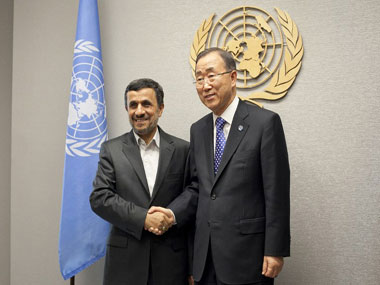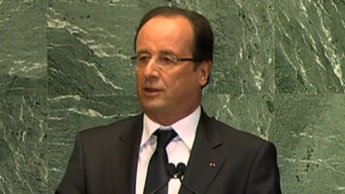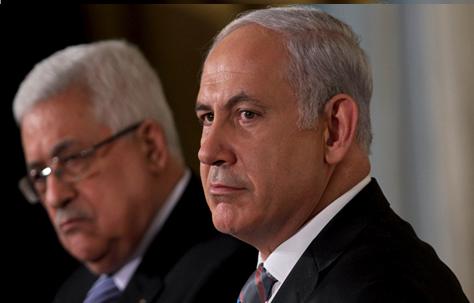Popular protests in the Arab world, Iran’s nuclear program and the offensive film against Islam were the file that topped the words delivered at the opening session of the United Nations General Assembly meetings in New York.
Popular protests in the Arab world, Iran's nuclear program and the offensive film against Islam were the file that topped the words delivered at the opening session of the United Nations General Assembly meetings in New York Wednesday.
 Ban Ki-moon: UN Should Continue Efforts to Face Ongoing Global Risks
Ban Ki-moon: UN Should Continue Efforts to Face Ongoing Global Risks
World leaders Wednesday vowed to work to stem a food crisis in west Africa's Sahel region, where millions risk starvation.
In his opening speech UN Secretary-General Ban Ki-moon stressed on Wednesday the need for the United Nations to continue its efforts to re-invent itself in order to face the ongoing global risks.
"The region needs your attention, your focus. Do not abandon it and regret it later," Ban said of the vast desert area stretching across nine west African nations, where armed Islamic and rebel groups have moved in.
On the Palestinian issue, Ban stressed the Palestinians' right to statehood, saying that the increase of Zionist settlements affect the peace process, and that the Zionist attempts to delegitimize the Palestinian Authority is worrying and totally rejected.
As for the Syrian crisis, the UN Secretary General pointed at the need to stop violence and arms smuggling by all sides, adding that the Syrian crisis has global implications, and calling on the Security Council to work to end it.
Ban also urged Sudan and South Sudan to settle their issues and solve the border crisis.
Obama: Peaceful Solution for Iranian Nuclear Issue
For his part, U.S. President Barack Obama opened his speech elegizing the U.S. ambassador to Libya "Chris Stevens" who was killed two weeks ago after demonstrators attacked the U.S. Consulate in Benghazi to protest against the U.S. offensive film insulting to Islam.
During his discourse, the U.S. President acknowledged the presence of tension between the West and an Arab world moving toward democracy. Obama said the path to democracy does not end once the people go to ballots.
Obama stressed the need for the fall of the Syrian regime, adding that Syria’s future should not be determined by a dictator who "kills his people."
On Iran, Obama said Washington wants to resolve the nuclear issue through diplomatic means, noting that there was still plenty of time to resolve this issue, but not indefinitely.
Al-Thani: Arab States Must Intervene Militarily in Syria
The Qatari Emir, Hamad bin Khalifa Al Thani, called Tuesday during his speech at the UNGA on Arab countries to intervene politically and military in Syria in order to end the ongoing crisis in this country.
Hamad said the ongoing violence in Syria since 18 months ago is "unacceptable anymore," adding that the Syrian government does not hesitate to use all kinds of weapons against its own people.
Hamad also stressed the need to intervene because all the efforts to get Syria out of what he described "the murder crisis" did not succeed, as the Security Council has failed to take a unified stance towards the Syrian crisis.
Ahmadinejad Talks Peace & Justice amid US Boycott
The Iranian President Mahmoud Ahmadinejad accused in Wednesday's speech the West of “arms race” and “nuclear intimidation" being perpetuated by “hegemonic powers," as well as “the continued threat by uncivilized Zionists to resort to military action.”
"Continued threat by the uncivilized Zionist to resort to military action against our great nation is a clear example of this bitter reality," he added.
Representatives of the US, Canada and the Zionist entity chose not to hear Ahmadinejad’s speech. Zionist Prime Minister Benjamin Netanyahu is expected to address the UN General Assembly on Thursday.
Mursi: Syrian Crisis ‘Tragedy of the Age’
Egyptian President Mohammad Mursi’s address followed Ahmadinejad’s speech Mursi, during which he voiced staunch opposition to the possibility of foreign military intervention in Syria.
Calling the current situation in Syria the “tragedy of the age,” Mursi said he would not rest until the crisis comes to an end, expressing his firm opposition to a foreign military intervention.
“Egypt is committed to pursue the sincere efforts it has been exerting to put an end to the catastrophe in Syria, within an Arab, regional and international framework - one that preserves the unity of this brotherly state, involves all factions of the Syrian people without racial, religious or sectarian discrimination and spares Syria the dangers of foreign military intervention that we oppose,” he said.
Mursi also highlighted the Palestinian-Zionist conflict, calling it a top priority before the UN General Assembly.
He said the UN resolutions on the conflict had not been effectively implemented and that Palestinians "must also taste the fruits of freedom and dignity" that other countries in the Arab region have won over the past year.
"It is shameful that the free world accepts, regardless of the justifications provided, that a member of the international community continues to deny the rights of a nation that has been longing for decades for independence," the Egyptian President said.
He decried the Zionist entity’s continued building of settlements on territory that the Palestinians have claimed for a future state in the West Bank and maintained that the UN must find a way to provide "immediate and significant measures to put an end to colonization, settlement activities, and the alteration in the identity of Occupied Jerusalem.”
 France Urges UN Security Council Meeting on Mali Intervention
France Urges UN Security Council Meeting on Mali Intervention
French President François Hollande called on the UN Security Council on Wednesday to meet urgently over Mali’s request for an African-led military intervention in the country’s north.
France and West African nations led calls for the creation of an African-led force to help Mali flush out rebels from northern territory seized in a March coup.
Mali's Prime Minister Cheick Modibo Diarra officially asked the UN Security Council to agree to "an international military force, one which would be composed of all those willing and able to help us reconquer occupied territories in the north of our country."
French President Francois Hollande said his country, the former colonial power, was ready to do "everything it can to support the troops that are being planned" and urged a Security Council meeting "as soon as possible."
"It has come time for the international community to take its responsibility to come to the assistance of Mali. The time has come," Hollande said. He later said he hoped the force would be set up within weeks.
 Abbas and Netanyahu
Abbas and Netanyahu
The Zionist Prime Minister and the Palestinian Authority President both addressed the United Nations on Thursday, one sought recognition for the Palestinian state, and the other warned of a dire threat to his entity of occupation.
One year after Mahmoud Abbas made his historic appeal to the UN General Assembly for Palestinian statehood, he returned with the more modest goal of seeing his territory given a kind of elevated non-member observer status.
The Zionist PM opposed the goal while direct talks are suspended, and came to New York with a more pressing concern -- Iran's nuclear ambitions.
Abbas, meanwhile, plans to launch a campaign to see Palestine recognized as a non-state member within the border that existed before the 1967 Six Day War -- when the Zionist entity captured the West Bank, Gaza and east Jerusalem.
If it did come to a vote, the Palestinians would probably win a majority of UN members, but they have reportedly promised Washington not to push the issue too hard until after the November 6 US presidential election.
Foreign ministers from the United States, Russia, China, Britain, France and Germany will meet in New York on Thursday to discuss the increasingly tense nuclear showdown.
